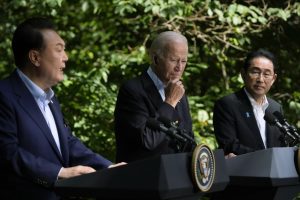A Japan-U.S.-South Korea summit was held at Camp David in August. The focus was primarily on the Korean Peninsula and North Korea, but discussion also encompassed the Indo-Pacific. This prompted strong objections from the Chinese Ministry of Foreign Affairs, which decried attempts to encourage geopolitical competition in the Asia-Pacific or to trigger confrontations between blocs into the region by forming small associations and groupings.
In reality, relatively few parts of the Joint Leaders’ Statement issued after the trilateral summit make direct mention of China. There is nothing like the contents of paragraph 51 of the G-7 Hiroshima Leaders’ Communiqué, and in fact the statement is quite restrained. Two instances where it does touch on China are the part about the South China Sea and another about Taiwan.
On Taiwan, the statement says, “We reaffirm the importance of peace and stability across the Taiwan Strait as an indispensable element of security and prosperity in the international community. There is no change in our basic positions on Taiwan, and we call for a peaceful resolution of cross-Strait issues.” This is based on the wording used in the G-7 Hiroshima Summit, namely: “We reaffirm the importance of peace and stability across the Taiwan Strait as indispensable to security and prosperity in the international community. There is no change in the basic positions of the G7 members on Taiwan, including stated one China policies. We call for a peaceful resolution of cross-Strait issues.”
However, whereas the G-7 Hiroshima Summit included the wording, “strongly opposing any unilateral attempts to change the peacefully established status of territories by force or coercion anywhere in the world and reaffirming that the acquisition of territory by force is prohibited,” the Japan-U.S.-South Korea summit statement uses no such wording that appears to be with Taiwan in mind. (The trilateral statement does make a similar reference to “unilateral attempts to change the status quo,” but directly mentions the South China Sea as the area of concern and does not specifically warn against the use of force.)
In total, the Japan-U.S.-South Korea Joint Leaders’ Statement avoids making any comments on China itself, with only limited references to the South China Sea and Taiwan in relation to the Indo-Pacific. There are many mentions of ASEAN, including support for the ASEAN Outlook on the Indo-Pacific (AOIP). This likely means that South Korea has stepped up its commitment to the Indo-Pacific. In fact, it appears that Japan, the United States, and South Korea will hold an annual Indo-Pacific Dialogue at the director-general and assistant secretary level.
It is exceptionally noteworthy that South Korea, whose security issues have fundamentally been focused on the Korean Peninsula, is turning its attention to the Indo-Pacific, and is looking to step up its involvement. Clearly, South Korea has joined the general framework of the Indo-Pacific. Moreover, the Joint Leaders’ Statement’s reference to the Taiwan issue will likely also prove to be an important step.
From China’s perspective, it looks like South Korea, which had previously kept some distance from the Quad, AUKUS, and the Five Eyes, has joined a new grouping consisting of “Japan, the United States, and South Korea,” and it is this development that has likely raised China’s ire. However, as is evident from the comparison with the G-7 Hiroshima Summit’s Leaders’ Communiqué, the Japan-U.S.-South Korea Joint Leaders’ Statement avoids directly condemning China or referring to Chinese domestic and foreign affairs. This most likely means that South Korea has avoided falling in line with Japan and the United States with regard to China itself. That said, with both Japan and the U.S. still seeking dialogue with China, it is admittedly quite possible that Japan and/or the U.S. wanted to avoid overt language.
So what involvement will South Korea have in the Indo-Pacific going forward, and how will it view and deal with China? Unless some level of consensus is reached among the three allies on China, it will be difficult to find common ground on the South China Sea and Taiwan issues. It is likely that discussions on these topics will continue at the director-general and assistant secretary level, but they will nonetheless likely prove a major challenge for South Korea.
































